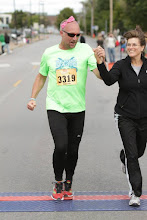(This article has very little do with handling your finances but the basic principles of "simplifying" your life are the same. This is not an endorsement that it is OK to cancel your homeowners insurance - your mortgage company wouldn't allow it anyway! - Enjoy!!)
By Larry McDuff
Fairhope, Alabama
November 1999
It happens every time.
When Ann and I return from a long hike, we immediately start getting rid of stuff. Since completing our hike of the Pacific Crest Trail from Mexico to Canada, we’ve given away a 14-foot aluminum jon-boat with trailer, a slalom ski, a windsurfer, two North Face down sleeping bags, a toboggan, a 35 mm camera with telephoto lens, an artist’s set of oil paints, a set of weights with bench, and four old tires. We’ve hauled two loads of clothing and miscellaneous junk to thrift shops.
I’ve even come close to giving away my 1983 Dodge Power Ram 50 four-wheel drive pick-up truck. Our son doesn’t need another vehicle, but he said he would take it. He couldn’t bear to see the truck leave the family after all these years.
After living perfectly well out of our backpacks for the past four and a half months, we get home and wonder, “Why do we need all this stuff?” The 10 pounds of gear in Ann’s pack along with 12 pounds in my pack was all we needed to live in desert heat or mountain cold, accompanied at times by rain, wind, snow, sleet, hail, and mosquitoes. Why should we need tons of stuff to live in the comfort of our own house?
Based on past experience, we have about 60 days before the urge to simplify our lives goes away. Then we’ll be stuck with whatever is left, at least until the next hike. You may have heard the saying, “You don’t own your possessions, your possessions own you.”
This is easy to see on the trail. Too many possessions, which translates to too much pack weight, weigh down your hike and cause injury, discomfort, and inability to hike the necessary mileage to finish the trail before winter.
Five years ago we started the Appalachian Trail with nearly three times our starting pack weight this year. Two weeks into that hike we met Keith, trail name Wolf, a legendary long-distance hiker.
On the trail, the most respected hikers are the ones with the fewest possessions. Wolf was carrying a super-small pack which weighed 14 pounds including food and water. When asked how he got his pack weight so low, Wolf would reply, “All you need to know is that it’s possible.”
Like everyone else, hikers become attached to their possessions. But the successful hiker will quickly give up a cherished possession as soon as he learns of a better way. For example, before this hike Wolf taught us how to make a one-ounce stove from a pineapple can which burned alcohol or solid fuel tablets. This replaced our 15-ounce $59 MSR Whisperlight stove which had served us well for over 4,000 miles of hiking. The cooking times were slower with the new stove, but there was a big gain in simplicity.
This principle is not easy to see in our modern culture, where success is generally viewed as proportional to the value and quantity of one’s possessions. Society percieves the owner of a big house which can hold more possessions as more successful, when in fact he may be held in bondage by high house payments, taxes, utilities, repair costs, and a general lack of freedom. In an ever-increasing need for protection he acquires security lights, burglar alarms, double locks, fences, and moves into a subdivision with a locked gate. He pays large insurance premiums so he can afford to replace everything in case all his protection doesn’t work.
Today we took our biggest step. We canceled the insurance on our house and its contents. It’s not that we could easily afford to rebuild a house this big and replace all its contents. It’s just that we wouldn’t need to. We feel we could live, even in our modern culture, in a much smaller house with drastically fewer possessions.
As Wolf says, “All we need to know is that it’s possible.”
Postscript: Sadly, Larry McDuff was killed in a hit-and-run accident while riding his bike near his home in June 2005. His wife, Ann, died in a similar bike accident just two years earlier.
Thursday, May 27, 2010
Subscribe to:
Post Comments (Atom)

No comments:
Post a Comment